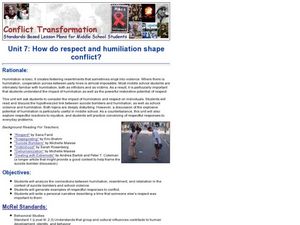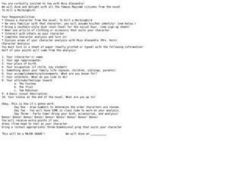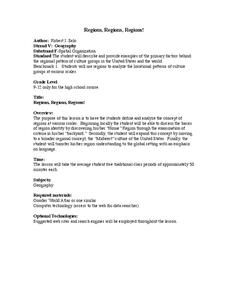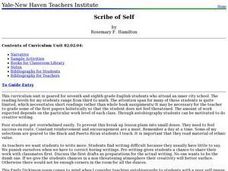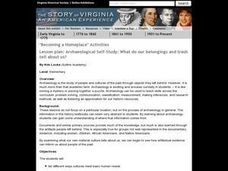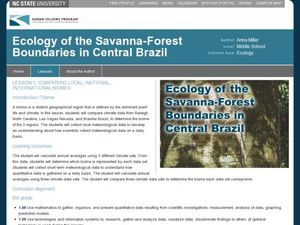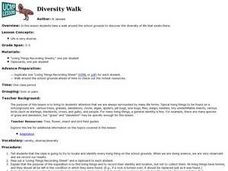Curated OER
Fossils
Students act as paleontologists to discover who a mystery guest to the classroom was. They do not know the identity of the guest but infer the identity from items left behind in the classroom. They make inferences from dinosaur fossils.
Curated OER
How Do Respect and Humiliation Shape Conflict?
Students explore the feelings surrounded by humiliation, resentment and retaliation in the context of school violence. In this character building lesson, students examine possible reasons for school violence and focus on possible ways...
Curated OER
To Kill a Mockingbird Tea
Ninth graders assume the identity of a character from the novel, To Kill A Mockingbird. They bring a southern-style dish (soul food) for social hour and wear an article of clothing that suits the character. They interact with other...
Curated OER
Crimes from Mother Goose
Students use Nursery rhymes in a discussion of crimes and criminals in order to study how criminal law has developed and changed to maintain an organized society. They decide on the identity of criminals, the crime, and the name of the...
Curated OER
Regions, Regions, Regions!
Students use regions to analyze the locational patterns of culture
groups at various scales. They discern the basics of region identity by discovering his/her "Home" Region through the examination of
criteria in his/her "backyard." In...
Curated OER
Sculpting a Modern Hero
Students examine the sculpture of the Greek hero Herakles. In this visual arts lesson plan, students choose a modern hero and create a sculpture that features the hero’s identity and attributes.
Curated OER
HI! HELLO! GOODBYE!
First graders study common forms of courtesy, greetings, and leave-takings appropriate to the time of day. They use common forms of address appropriate to one's relationship with another person's age, rank and number. They draw two...
Curated OER
Canadian Citizenship and National Identity
Students explore the dynamics of Canadian citizenship. They plan and produce a school wide celebration of citizenship.
Curated OER
Scribe of Self
Seventh graders read "Diary of a Young Girl" by Anne Frank. In groups, they discuss the reasons why people would write an autobiography and identify their own identity crisis. After reading excerpts of other autobiographies, they...
Curated OER
Autobiography
Eighth graders identify key components of an autobiography. They plan and draft an outline of a summer school mini-autobiography and employ peer evaluation in revision step of writing process. They explain difference between revision...
Curated OER
Cats
Students participate in an after school program that promotes communication with others, solving problems, and making decisions. They experience getting in touch with themselves, about cats, training cats, showing cats and explore...
Curated OER
Who's In The Bag?
Students bring in a bag from home with personal items. In this ice breaker lesson, students bring 10 personal items to school. The teacher shows them, asks the students questions, and has them guess as to the owner of the bag.
Curated OER
"The Election"
Students participate in an election for the purpose of comprehending the political process and the responsibilities that come with citizenship in a free society. They elect officials with no identity and are surprised with the revealing...
Curated OER
An Automobile Phylogenetic Tree
Learners study a list of cars and trucks and think about characteristics that can be used to show an "evolutionary relationship". From the characteristics they identity, students construct a phylogenetic tree to show how the automotive...
Curated OER
Social Studies: Dressing in Style
Learners explore the effects of personal appearance and determine if their own is acceptable. They examine clothing and discuss the situations in which the various items would be appropriate. Students take pictures of others in the...
Curated OER
Archaeological Self-Study: What Do Our Belongings and Trash Tell About Us?
Students examine how their belongings and their trash represents who they are. In this archaeology skills lesson, students watch a video titled "Discovering the Past" and then give archaeological techniques a try. Students examine and...
Curated OER
Comparing Local, National, International Biomes
Students calculate averages of climate sets of data. In this ecology instructional activity, students analyze data to determine identity of a biome and collect meteorological data to understand process. Students also compare data sets.
Royal Society of Chemistry
Organic Molecules Day—Chemistry Outreach
In search of an organic lab that employs real-life techniques and analysis methods? Groups carry out the nitration of methyl benzoate, then attempt to determine the number and location of the nitro groups added to the benzene ring....
Curated OER
Data Defense
Students explore the meaning of privacy, and then defend contrasting positions in legal cases relating to electronic privacy rights.
Curated OER
It's All About Me
Students engage in a variety of activities to develop the skills they need to answer questions about themselves. They respond to questions relating to their ages, names and favorite colors.
Curated OER
Cultural Diversity In The Classroom
Students engage in a lesson that supports the fact that Asian people are part of the educational culture in schools. The lesson includes background information for the teacher. With the completion of the unit students develop a personal...
Curated OER
Diversity Walk
Pupils take a walk around the school grounds to discover the diversity of life that exists there.
Curated OER
That Was Then, This is Now: When I Was Puerto Rican
Students explain how geographic/cultural setting influences identity by comparing/contrasting Esmeralda's Puerto Rican self with her American self. They closely read text to pinpoint when Esmeralda was no longer Puerto Rican. Students...
Curated OER
United We Stand?
Students consider the consolidation that led to the creation of greater New York City in 1898, and what would happen if their own class, school, or community united with its neighbor or neighbors.



